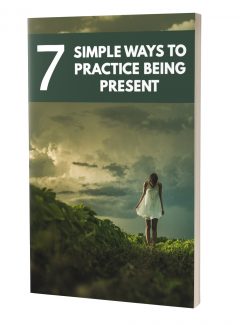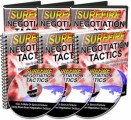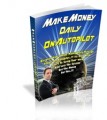 License Type: Master Resell Rights
License Type: Master Resell Rights  File Type: ZIP
File Type: ZIP
 SKU: 64535
SKU: 64535  Shipping: Online Download
Shipping: Online Download
Sample Content Preview
Introduction
The amount of time most people spend not being present is massive. More than that, it's a massive amount of unproductive, useless, wasted time. It's not an exaggeration to say that many people spend the majority of their day in a state of non-presence.
We waste time dwelling on the past, usually on depressing things like losses, failed relationships, or other negative experiences. We play these experiences over and over in our heads, thinking that if we had done this or said that things would have turned out differently. We often blame others but more often, we blame ourselves.
Oftentimes, these negative memories are accompanied by unhealthy emotions like bitterness, resentment, and guilt. These emotions, when left to simmer inside of us can literally become toxic, affecting both our physical and mental wellbeing.
The other side of the coin is the future. We spend hours thinking about the future - worrying, more precisely. We worry about our health, our finances, our children, and our careers. We overload our brains with 'what if?' questions. What if I lose my job? What if I fail the exam? What if I don’t meet that deadline? What if I can’t make my mortgage payments?
Whatever your fears and worries are, join the club. We all have our personal 'what ifs' that keep us tossing and turning at night.
Why is this a waste of precious time? Because the past and the future are out of your control. There's no way on earth you can control either.
Yes, you can learn valuable lessons from past experiences and move on. But will dwelling on them transport you back in time to fix things?
You can - and should - plan for the future as best as you can. But will worry and anxiety about the future steer things to go your way?
This is why learning to live in the present is the best option for living a happy, productive, and fulfilling life. When you live in the present, you're in control. You're in control of what you say and do in the present moment and how you react and behave in certain situations. This is very empowering.
Stop here and reflect for a moment. When was the last time you were present, fully in the moment and totally focused on the here and now? When was the last time you were in control?
Another word for being present is mindfulness. It is one of the most powerful and transformative qualities you can develop. Mindfulness is an innate quality that each person is born with. As young children, we had no conception of past or future. We lived fully and completely in the present moment.
Re-learning this powerful trait is essential in order to become your best possible self.
The benefits of mindfulness
Here are just some of the benefits of mindfulness that can dramatically shift your mindset and change your life:
- It significantly reduces stress and anxiety.
- It improves personal relationships by promoting higher empathy.
- It allows us to release toxic emotions like bitterness, anger, jealousy and deep grudges.
- It breeds acceptance and helps us cope better with hardship and adversity.
- It promotes physical and mental health.
- It promotes better sleep.
- It enhances productivity.
- It improves mental focus and clarity.
- It improves emotional wellbeing.
7 Ways to Become More Present
Living mindfully can become second nature to you if you train your brain to make it a habit.
These 7 exercises will put that process into motion. The more you practice them, the faster your brain will make mindfulness a habit and guide your behavior accordingly.
Mindfulness breeds mindfulness. As your brain starts to develop the habit, you will stay mindful for longer periods of time until you are able to remain present throughout your day.
These exercises require nothing more than a few minutes of your time each day to begin a dramatic transformation that will amaze you.
- License: Master Resell Rights
- Category:Ebooks
- Tags:2022 Ebooks With Audio Master Resale Rights








